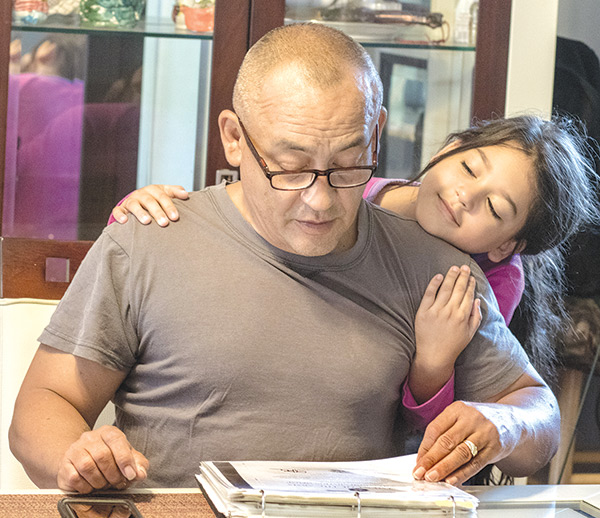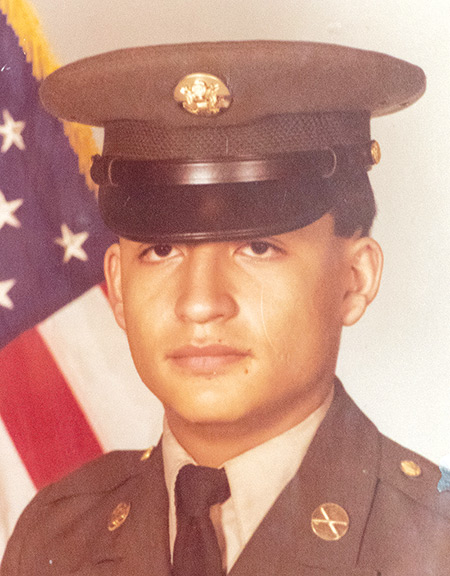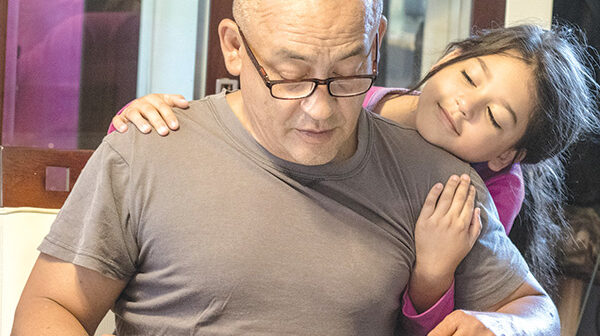
Anahi Rivadeneira, 8, hugs her father, Carlos Rivadeneira, at the kitchen table of the family’s home as he speaks of losses the family has survived and reads through his military service records and awards. (Sarah Blanchard Photography) 
Rivadeneira in his younger days
Carlos Rivadeneira Jr. grew up in the Bronx, a borough of New York. In October 1979, when he was in eleventh grade, he left school to join the military, shipping out to Fort Sill in Oklahoma.
“Growing up in the Bronx is kind of difficult,” the 57-year-old said. “I had the option of: ruin my life or go into the service.” In 1986, Rivadeneira left military service and returned to New York, where he found work in various maintenance jobs. In 1992, he joined the Army Reserves, and following the terrorist attacks on Sept. 11, 2001, he returned to active duty, volunteering to go to Iraq in August 2005. “I just wanted to go,” he said.
During this first tour in Iraq, Rivadeneira survived several harrowing experiences that left him with injuries that still plague him. He and his fellow soldiers were riding in a vehicle struck by an improvised explosive device. “I hit my face and lost some teeth, suffered severe hearing loss, my knees got buckled against the vehicle because I wasn’t wearing a seatbelt,” he said. He had stopped wearing a seatbelt in the humvees after he heard about “some soldiers that got stuck in their humvee and got burned to a crisp because they were stuck in their seatbelts.”
As he talked, he stood and limped, stiff-legged, to some shelving in the corner behind his seat. He dropped three large, white bags of medications on the table. Medically retired since Oct. 8, 2014, he said, “This is not a normal retirement life. I live in pain.” The three bags contain lotions for a rash he contracted in Iraq, pain medications for his back and knees, medications for his degenerative joint disease and cholesterol medication, among a host of other pills and ointments. “This is my monthly supply,” he said. “I live in pain—physical and mental pain.”
To help himself cope, Rivadeneira takes advantage of resources offered by the Veterans Administration, including therapy, psychological evaluations and medical procedures. From 2012 to 2013, he underwent five surgeries, including knee surgery, shoulder surgery and the insertion of a plate and four screws in his neck. “They all came back to catch up with me,” Rivadeneira said of the old injuries sustained during his first tour in Iraq.
In addition to suffering from his own physical trauma, Rivadeneira lost one of his best friends, Sgt. 1st Class Carlos Saenz, in Iraq. It was just “days before we were supposed to leave. He was killed by an IED,” said Rivadeneira. It would not be the last time he lost a friend to tragedy and violence. A few years later, his friend Spc. Branden Spencer died. “One morning I got a call at 3:30 that an accident happened with a weapon.” Rivadeneira was at Spencer’s side “until he took his last breath. I escorted him back to his mom in Rochester, New York. I took his body back in full uniform, full honor.” At the time, Rivadeneira’s wife, Hilda, was pregnant with their second child. “My son was going to be named Carlos,” Rivadeneira explained, after the friend he had lost in Iraq. “But I changed his name and named him Branden.”
In 2009 on the anniversary of Spencer’s death, Rivadeneira and his infant son Branden, born Dec. 29, 2008, were driving to New York so Rivadeneira’s father-in-law could meet his new grandson. “We got into a car accident and Branden was ejected from the car,” Rivadeneira said. Branden survived but still grapples with the traumatic brain injury he sustained in the accident. Just three months later, in August, Rivadeneira deployed for his second tour in Iraq. “I needed that space,” he said of having to leave behind his injured son, “I had to go somewhere and try to keep myself occupied because I didn’t know how else to deal with it.” As he spoke, his 8-year-old daughter, Anahi, walked into the kitchen and wrapped her arms around her father in a bear hug. He kept talking, gently patting her hands where they rested around his neck. He didn’t look at her, but said, “The only reasons I am still on this Earth is my kids. If my kids weren’t here, I wouldn’t be here. I would have ended it already.”
Children—his own and others—hold a special place in Rivadeneira’s heart. During his time in Iraq, he worked in Civil Affairs. “We helped a lot of schools—rebuilt them, gave the kids supplies. Those kids over there live in mud houses. They eat from whatever they find. They don’t have anything to play with. To give these kids a book bag with school supplies and just a toy or a ball—it brings you peace of mind to see the happiness you bring them.”
In addition to Anahi and Branden, Rivadeneira raised children from a previous marriage. “Seeing the kids there and then coming back and having my kids all over again—it makes me think twice about how good my kids have it here compared to those kids over there. Those kids don’t have anything to look forward to for the next day.”
In June 2010, Rivadeneira’s final tour came to an end, but his own personal battles raged on. He landed in the United States on the morning of June 19. He had planned to pick up his wife and children and travel to New Jersey to see his mother. “But when I walked into the house, my wife was in the hallway. I just looked at her face, and I already knew. She didn’t have to say nothing, her face just told me everything.” Just eight hours before Rivadeneira’s flight landed, his mother had died. “[When] I got on that plane home, I knew she was ill. I didn’t know she was dying.”
In August 2010, just over a month after his mother’s death, Rivadeneira’s daughter, Anahi, was born. On May 3, 2011, a second son, Carlos, arrived. What should have been a joyous occasion very quickly turned mournful. “He passed away May 4,” Rivadeneira said. “He never even got to leave the hospital.” Rivadeneira and his wife buried their son in a cemetery in Hopewell “by the river’s shore.”
After over 21 years in the armed forces, Rivadeneira said, “I do miss the military. It’s hard waking up one morning and not doing what you love doing. I love being a solider.” Rivadeneira talked about the several medals and awards he’d won, “but they are in the attic, and I can’t get in the attic.” His wartime knee injuries prevent him from accessing his attic, so instead, he brought out a three-ring binder bulging with letters and photocopies of award certificates.
Rivadeneira said his children are his reason for living. “They are the purpose, the only purpose. I don’t care about anything else. I’ve been there, done it. Been around the world, been in combat, lost friends.”
Despite the losses, sacrifices and pains, he said what he did “gave my kids freedom and security. What I was doing was something positive, not only for myself, but for my kids and my country.” His most important lesson, is: “Tell your kids every day you love them … Not once, not twice, all day. ‘Cause life is short. Nobody’s promised tomorrow.”


